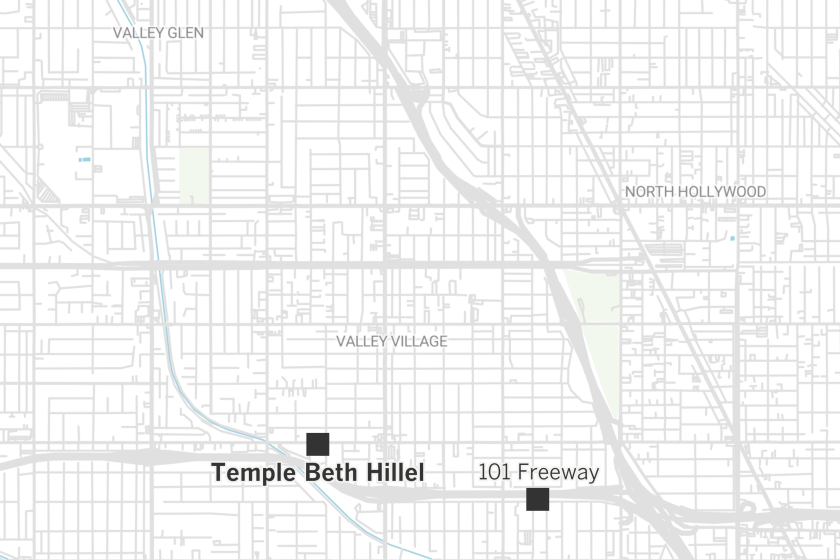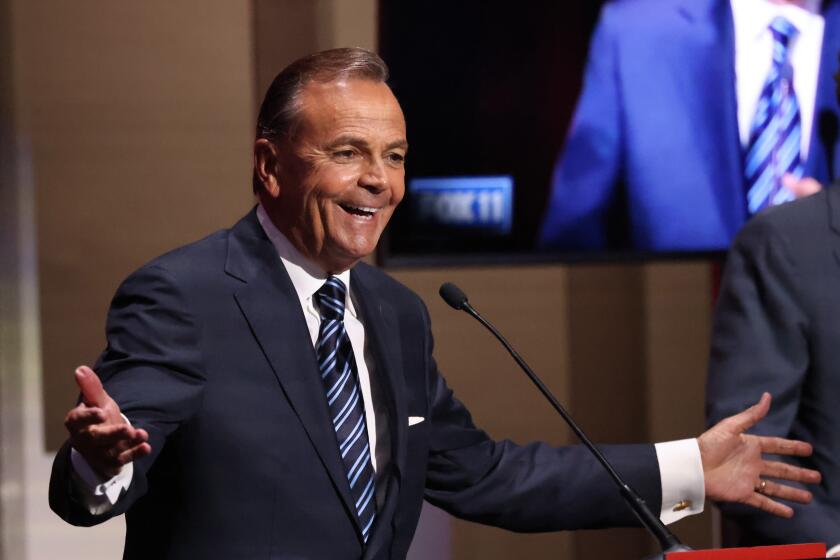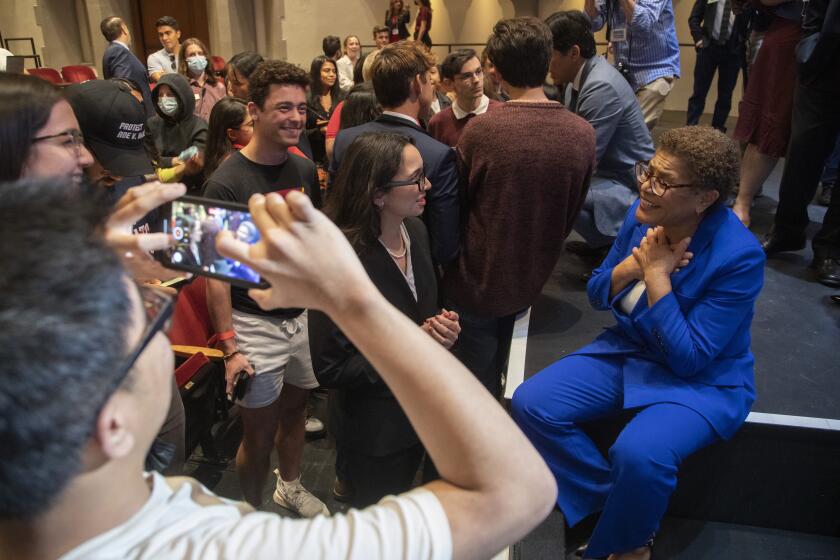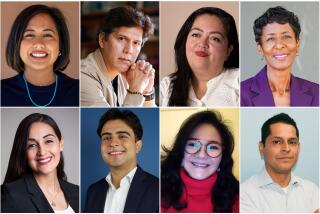Column: We had a real L.A. mayoral debate. It can happen when idiot protesters don’t spoil it
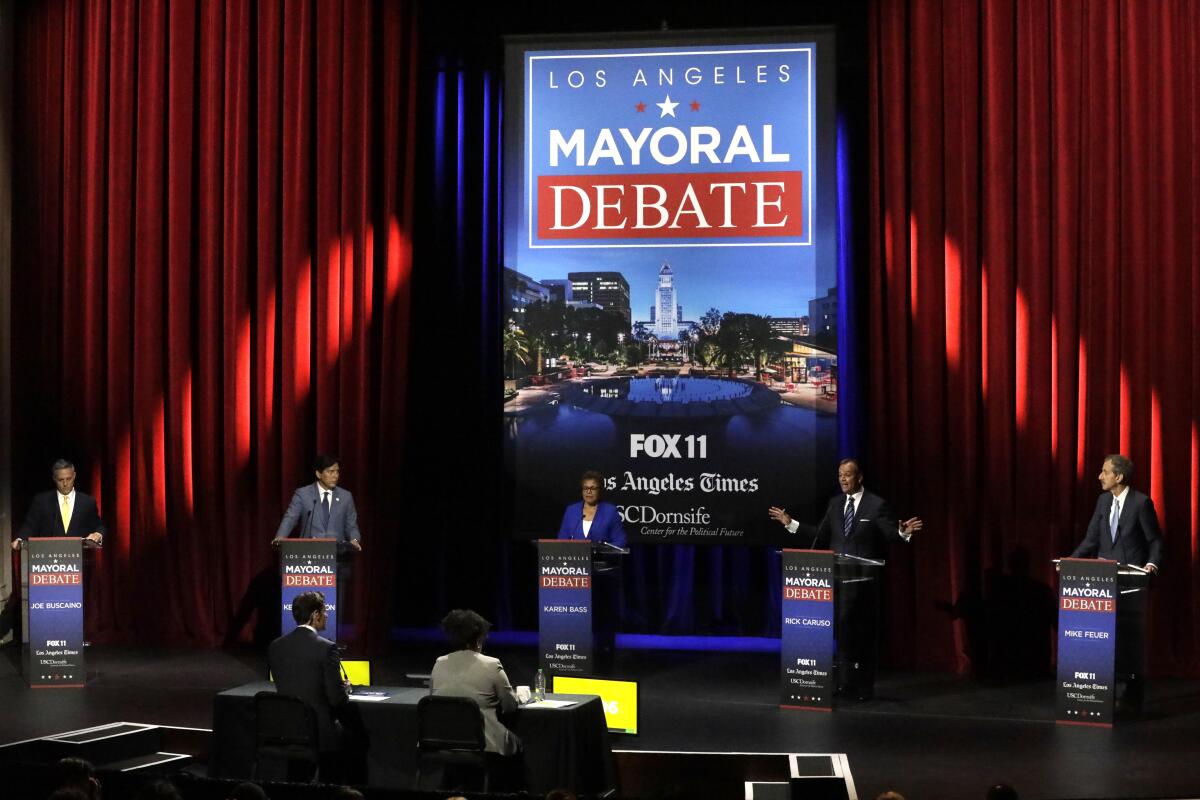
- Share via
From the moment I stepped off the stage after co-moderating the second televised Los Angeles mayoral debate on Tuesday night, people have been asking me who won.
Front-runner Rep. Karen Bass? City Atty. Mike Feuer? Perhaps one of the L.A. City Councilmen, Kevin de León or Joe Buscaino? Or maybe political newbie and billionaire real estate developer Rick Caruso?
And yet, the more I’ve thought about it, the more I’m sure the answer is none of the above.
That’s because the answer is voters.
For the first time on TV — and increasingly one of the few times on the campaign trail — the candidates vying to lead Los Angeles actually got a chance to explain their plans without being shouted down by hecklers in the audience insisting they’re legitimate activists.
At USC’s Bovard Auditorium, no one got dragged out by security while shouting about how this politician or that politician is this epithet or that epithet. No one caused a scene, angrily rushing the stage with unknown intentions.
A group of activists disrupted a Los Angeles mayoral candidate forum at a San Fernando Valley synagogue on Monday night.
Compare that to what happened on Monday, when a mayoral forum on homelessness was forced to end early after a small group of activists began cursing at the candidates inside Temple Beth Hillel in Valley Village.
“You had folks screaming at the top of their lungs,” De León told me. “They couldn’t even respect the fact that they were in a house of worship.”
“I witnessed a father drag his daughter out of the temple because they were afraid,” Buscaino said, recounting the scene at the San Fernando Valley synagogue. “The profanities. The shouting. Even the little girl was terrified.”
And then, of course, there was the first televised debate at Loyola Marymount University in February, when another small group of activists started yelling obscenities and refused to shut up, bringing the policy discussion to a halt multiple times.
“This handful of people decided, well, you know, our voices matter more than anybody else’s,” Feuer told me. “And that is not what democracy is about.”
Indeed, it’s not. And that’s why voters were the winners on Tuesday night.
Sure, the candidates made us listen to some groan-inducing zingers, like this one from De León to Caruso: “I have a body of work that you can only dream of having.”
But we also got some unexpected, but useful promises, like this one from Caruso: “I will release everything that I’ve paid in taxes, including the taxes on that boat, which I paid.” And most important, we got to hear the candidates have a substantive back-and-forth discussion about their plans to lead L.A. out of these troubled times.
How they would get a handle on homelessness, for example, and all of the interrelated affordability, housing and addiction issues that exacerbate it.
Also, how they would address the widespread fear over crime that, while not necessarily supported by the data, has become a top issue among Angelenos. That includes how they would improve public safety, whether that’s through hiring more police officers or beefing up reforms.
A good debate, in many ways, is what the democratic process is all about. It’s how voters get to compare and contrast candidates, and then decide whom to elect.
But thanks to a roving group of shortsighted, entitled people, we’ve often been deprived of that this election cycle.
Most of the protests seem to be organized by a loose collection of far-left activist groups. Their beef tends to boil down to a couple of topics. First, that L.A. spends too much money on police and doesn’t need more officers and, second, that the city is harming unhoused residents by clearing encampments.
Will Sens, for instance, told The Times that he disrupted the forum at Temple Beth Hillel because he’s mad at the candidates for supporting the city’s anti-encampment ordinance.
Column: Only Karen Bass knew Rule No. 1 in the mayoral debate: Don’t help Rick Caruso steal the show
Most candidates seemed determined to cut latecomer Rick Caruso down to size, but they wound up making him the star of this TV production.
“I decided to protest because every single one of the people in there is a lying bastard,” he said. “They’re supporting measures that are having people killed on a daily basis.”
Uh huh.
And yet, in the broadest of strokes, I actually share some of the activists’ concerns about policing and homelessness. This is perhaps the most infuriating thing. It’s also one reason I’ve hesitated to write this column.
I agree the city spends too much on the LAPD and question whether we need more officers, as most of the candidates for mayor have said we do. And while I certainly don’t think getting people off the streets and into hotel rooms amounts to putting people in “internment camps,” as some activists have suggested, I detest the way the city splits up unhoused encampment communities, haphazardly shipping them from temporary bed to temporary bed with no guarantees for the future.
I hate the whole “protest the right way” argument. That’s another reason I’ve hesitated to write this column.
But by shouting obscenities at mayoral candidates during debates and forums, activists aren’t getting any of their points across. In fact, they are doing the exact opposite, with more and more Angelenos dismissing progressive views on homelessness and policing as fringe and unworthy of their time.
“In which parallel universe is it better to live on a cold slab of cement, where the only thing that can protect one is a flimsy zipper, in comparison to a hotel room with clean sheets and clean towels?” De León asked.
Or take what happened during the televised debate in February, when one activist stood up and interrupted the mayoral candidates, shouting: “No one wants more cops in Los Angeles!”
The audience booed and told him to shut up, nearly drowning out yet another activist, who yelled: “You in this overwhelming white room are booing people of color! You are booing Black and brown people!”
“This is theater,” Feuer said, shaking his head. “This is theater masquerading as protest.”
Here are six takeaways from Tuesday night’s L.A. mayoral debate, the first featuring Rick Caruso.
Indeed, more than a few mayoral candidates don’t even call what’s happening “protests.” They consider it an insult to actual protests held by actual activists.
But no matter what you call it, the mere threat of such disruptions has already had a negative effect on the democratic process in Los Angeles. Even when voters win, as they did on Tuesday night, they lose.
Extraordinary measures were taken to ensure there would be no hecklers at USC’s Bovard Auditorium. The number of attendees were limited. Media, too. Everybody was screened.
Minutes before the broadcast, several of us, including my co-moderator Elex Michaelson of Fox 11, warned those seated that if they interrupted the candidates, they would be immediately removed and we’d go to a commercial break.
It worked. But at what cost?
Bovard Auditorium should’ve been packed with voters ready to listen to all five candidates for mayor explain their plans. But it wasn’t.
“What are we trying to accomplish here? And what is your end goal?” Buscaino asked. “The 1st Amendment right does not give you a right to be a bully.”
More to Read
Sign up for Essential California
The most important California stories and recommendations in your inbox every morning.
You may occasionally receive promotional content from the Los Angeles Times.
